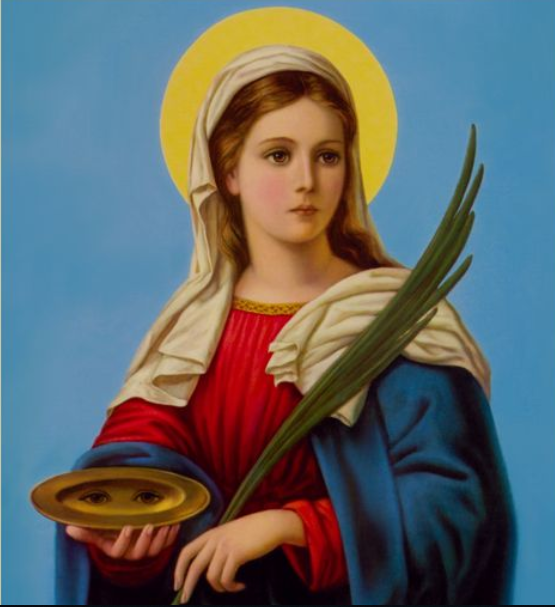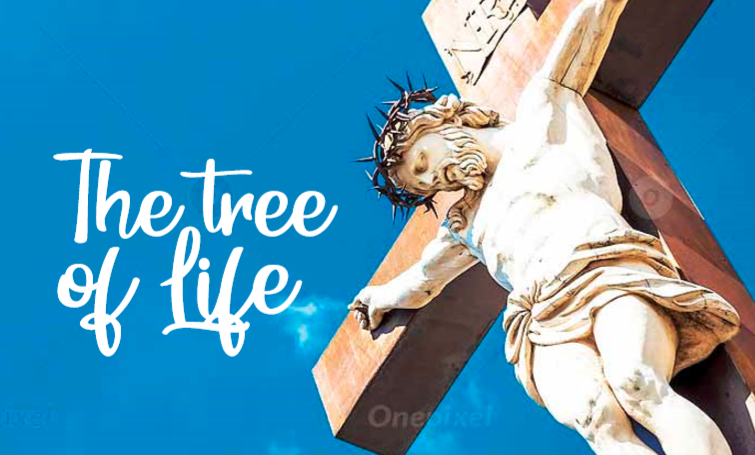Year: 2019

St Lucy
St Lucy is a renowned saint who was persecuted and became a Christian martyr. Not only is she accepted as a saint in the Roman Catholic Church but also in the Anglican, Lutheran and Orthodox Churches. St Lucy’s feast day is celebrated on the 13th of December, it was held in her honour in early Britain around the middle ages. Lucy was born into a rich family; however, it has been said that her father passed away when she was only 5 years of age. She consecrated herself to Jesus and wanted to give her life to the needy and poor. So, she hoped to distribute her settlement of marriage to them. Her mother suffered a bleeding disorder and without knowing the decision Lucy had made to God, her mother who was worried about her future; arranged her marriage with a wealthy young pagan man.
A Miracle
St Agatha played a big role in St Lucy’s life. In a dream, she came to Lucy and revealed that God was pleased with her life and the way she lived out her faith. She promised that she would be the glory of Syracuse as she was of Catania. As a reward, St Agatha told that her mother would be cured because of her faith. Later she discovered that her mother was completely healed.
Martyrdom
After this, Lucy persuaded her mother to give away the fortunes that belonged to them to the poor. It has been quoted that she said “…whatever you give away at death for the Lord’s sake you give because you cannot take it with you. Give now to the true Saviour, while you are healthy, whatever you intended to give away at your death.” The news spread to her fiancé that her jewels and valuable items were being distributed among the needy. This enraged him and he denounced her to the governor of Syracuse. Here they tried to force her to burn an offering to the image of the emperor and to this she refused. It was said that when the guards came to collect her they were unable to move her! Additionally, bundles of wood were put upon her and set on fire, however, it would not burn! Finally, she was put to death by a sword.
Through St Lucy’s life, we can understand the love and care she had towards those who were needy. One major factor that we can notice is her boldness to say no to sin when she was asked to burn an offering. May we also get the courage and boldness to stay strong in faith and say no to sin like her! Legend has it that her eyes were gouged out. This is one of the reasons that St Lucy is the patron saint of eye illnesses. When her body was prepared for burial in the family mausoleum it was discovered that her eyes had been miraculously restored.
Veneration
The emblem of eyes on a cup or plate apparently reflects popular devotion to her as protector of sight, because of her name, Lucia (from the Latin word “lux” which means “light”). In paintings St Lucy is frequently shown holding her eyes on a golden plate and a palm branch which is the symbol of martyrdom and victory.
– by Nihaal Manoj from Derby, UK

Guilt? Shame?
The devil has a way of making a sin look like no big deal when you are thinking of committing it, but too big of a deal for God to forgive you after you’ve done it. We’ve all experienced the endless voices of harsh thoughts after we’ve made mistakes. So, how do we know which voices are from God?
If you have fallen in your pursuit of purity, it’s important to know the difference between condemnation and conviction. Condemnation is the voice of guilt that makes us feel damaged, worthless and shameful. This was the reaction of Adam and Eve when they hid from God in the garden. Their feelings of condemnation resulted in their failure to run to His mercy— and this was what hurt Him most of all! Conviction, on the other hand, allows us to see how we have failed and therefore calls us to change. This is why St Thérèse could say that her weakness and wretchedness were like an elevator that kept her close to God. Conviction motivates us to hold fast to mercy.
How about you? Have you made mistakes? Have you fallen in your path to purity? Have you made choices you aren’t proud of? Do you feel the weight on your conscience? Do you hate your sin? Welcome to the club! We’ve all heard people talk about “Catholic Guilt.” The misconception is that Catholics are shamed into good behaviour because of inner condemnations. On the contrary, when we make a mistake, our conscience knows we were created for more. The healthy version of “Catholic Guilt” gives us the drive to find out what that “more” is all about.
Chances are you’ve heard some follow-up chatter in your mind and felt it in your heart as you’ve wallowed in guilt. So, how do you know if these thoughts and voices come from God? Here are some ways to discern God’s voice from all the others: God speaks with conviction, not condemnation. His voice never encourages shame, only an invitation to conversion. It’s God’s kindness that pursues our brokenness. “Surely goodness and mercy shall follow me all the days of my life, and I shall dwell in the house of the Lord my whole life long”(Psalm 23:6).
The voice of God doesn’t make us feel hopeless, but always provides a way out. “No testing has overtaken you that is not common to everyone. God is faithful, and he will not let you be tested beyond your strength, but with the testing he will also provide the way out so that you may be able to endure it (1 Corinthians 10:13). God’s voice is usually gentle, not harsh or obtrusive. The devil will make you feel like there are these daunting labels put upon you that are too overwhelming to overcome like – you’re selfish, worthless, impure. God will call you to precise, specific ways to turn from sin and encounter Him. “And when he comes, he will prove the world wrong about sin and righteousness and judgment (John 16:8). God’s voice makes us feel like everything is under control. “ In your hand are power and might, so that no one is able to withstand you” (2 Chronicles 20:6).
The God whose words created the universe wants to speak peace into your life. The devil wants to speak discord and indignity. “Not that I seek the gift, but I seek the profit that accumulates to your account” (Philippians 4:17). God came not to ruin our joy but to fulfill it. When you encounter a voice ask, “Does this voice bring me abundant life or shrink my heart?” “The thief comes only to steal and kill and destroy. I came that they may have life, and have it abundantly” (John 10:10). God’s word strikes us in a place that no one else can access. His word penetrates us in a way nothing else can. “Indeed, the word of God is living and active, sharper than any two-edged sword, piercing until it divides soul from spirit, joints from marrow; it is able to judge the thoughts and intentions of the heart” (Hebrews 4:12).
To hear the Lord, we must give Him a chance to speak. Our lives are so full of distractions and in every moment the world is vying for our attention! God wants to speak His love into our shame. It’s in this relationship with Jesus that we can discover that it is God’s kindness that leads us to repentance. His mercy wants to recreate us in His love! Jesus doesn’t come to us in anger but rather with a desire to reconcile so that we can be together with Him forever. Let His voice calm the storm in your heart and heal you in the way only He can!
This article originally appeared on www.womaninlove.org
– by Katie Hartfiel, USA

The Weight of the Cross
As follower of Jesus was going through a very tough time. Despite appealing to the Lord in prayer there seemed to be no relief from his suffering. Then one night he had a dream. In the dream the Lord came to meet this struggling Christian and together they went to a large warehouse which were full of crosses. The disciple was amazed to see so many different types of cross in one place. There were tall ones, small heavy ones, smooth ones and rough ones of all sizes. The Lord then lovingly invited His disciple to choose the cross he would most like to carry.
For the next few hours he tried out many crosses, some were too heavy, others too large to hold, still others were too rough and gave splinters. After much searching the disciple presented the cross of his choice. “My child,” said the Lord gently, “this is the very same cross that I in my loving wisdom had chosen for you, the one you have been carrying.”
The Way of the Cross
Jesus said to all who would listen ‘whoever wants to be my disciple must deny themselves and take up their cross daily and follow me’ (Luke 9:23). This is not popular and never has been, however the reality of the cross is central to our faith. The only way for Christians is the way of Jesus, and that is the way of the cross. For not only is Jesus the Way, the Truth and the Life but also since the earliest days of the Church, Christians have been known as ‘followers of the Way’.
Perhaps there are times when, like the disciple in the story, everything seems too much and we feel we cannot go on. Our Lord Himself knows all about this. During the Stations of the Cross we meditate on His falling three times on His way to Calvary. Jesus fell under the weight of the cross, under the weight of our sins, so He knows best of all how heavy the cross is. However, each time He got up and continued His journey. Jesus also knew what it was to accept the help of others; Simon of Cyrene physically carried the cross and the presence of His Mother Mary consoled Him on His journey. Sometimes we too need to allow ourselves to be helped by others.
Becoming Mature Christians
The weight of the cross shows the weight of God’s love because Jesus bore everything due to His love for us. The cross has not only set us free, purchasing forgiveness and healing, but also offers us the possibility of a totally new life. God loves us too much to leave us as we are, so He is continually at work in our lives, through the cross, to transform us into saints. If we accept the work of the cross in our lives we can be progressively liberated from self-centred and destructive ways of living.
The Bible, in Hebrews chapter 12, reminds us that God our loving Father makes use of suffering as part of our training. He does this to make us mature, so that we might share in His own holiness. It promises that our suffering will ultimately bear fruit in peace and goodness if we remain with the Lord (Hebrews 12:1-13).
Eternal Glory
The most wonderful news is that the weight of the cross gives way to something much greater- the weight of the resurrection! Our troubles and sufferings, which will soon be over, are preparing us to carry a much greater weight, the weight of eternal glory! St Paul tells us that “For this slight momentary affliction is preparing us for an eternal weight of glory beyond all measure” (2 Corinthians 4:17).
Imagine a weight lifter building up his strength in training. He uses lesser weights to build up his strength. Over time he is able to bear a much greater weight. So it is with us, God makes use of trials to mature us and prepare us to receive the full weight of eternal glory, not just in heaven but even in this life we can taste the peace and joy of the risen Jesus. Jesus has conquered sin and death, through His cross and resurrection everything is transformed, even our sufferings, for now we see them in an eternal perspective.
Prayer
Lord Jesus, help me to take up my cross every day and follow you. When I fall under the weight of the cross please give me the strength to get up again. Help me also to accept the help of others on my journey of faith. I praise you Lord that you are using my trials to mold me and prepare me for eternal glory with you. Amen.
-by Alex Heath, the Adviser for Adult Faith Formation, Catechetic and Chaplaincy in the Northampton Diocese in the UK

March 2019 – Editorial
The message of the entire Bible gives us encouragement because it is a depiction of God’s love for us. It contains the promise that God has a wonderful plan for us. It’s reassuring to know that God’s love and mercy for those created in His image is never ending! “I give them eternal life, and they will never perish. No one will snatch them out of my hand. What my Father has given me is greater than all else, and no one can snatch it out of the Father’s hand” (John 10:28-29). What an encouragement to anyone who has ever had doubts about their salvation and God’s love!
He understands that we are weak and fragile. In His love, He reassure us that His grace is sufficient for us. “The Lord, your God, is in your midst, a warrior who gives victory; he will rejoice over you with gladness, he will renew you in his love; he will exult over you with loud singing” (Zephaniah 3:17). Imagine hearing the voice of God, singing over you!
In this issue, we meet a God who is greater than all the problems we face and how we can turn our disappointments into becoming a true disciple and what God has to say about our feeling of guilt and shame. Happy reading!
K R 58

The Tree of Life
The book of Genesis mentions two trees in the Garden of Eden, the tree of life and the tree of knowledge of good and evil. Adam and Eve were given the freedom to eat from all, except the second tree. Genesis 3:22-23 says that after the fall, man was banished from the garden so that he would not
eat from the tree of life in his unholiness. But God promised a Saviour who, through His death and resurrection, would crush the head of Satan and save mankind from his venom.
Born Again
When we listen or read the Word of God, we are approaching eternal life. “To all who received him, who believed in his name, he gave power to become children of God” (John 1:12). Further, through the Sacrament of Baptism, we are born again. That promise is seen in Revelation 2:7 – “To him who conquers I will grant to eat of the tree of life, which is in the paradise of God.” Psalms 1:3 refers to the righteous man, that is a holy person; “He is like a tree planted by streams of water, that yields its fruit in its season, and its leaf does not wither. In all that he does, he prospers”. Thus, if I want to be a holy person then I should place myself near a stream of living water, so that I may produce the fruits of the Holy spirit and remainevergreen, unaffected by the seasons of the world. Jesus said to the people around Him, “If any one thirsts, let him come to me and drink.” He who believes in me, as the scripture says, `Out of his heart shall flow rivers of living water’ (John 7:37-38). The next verse explains, “Now this he said about the Spirit, which those who believed in Him were to receive.” The Book of Revelations 22:2 says that the tree of life produces the fruits of the Holy Spirit.
Through Sacraments
Through the Sacraments of Baptism and Confirmation we receive the Holy Spirit. Mathew 12:33 says that the tree is known by its fruit. Ezekiel 28:7 says, you were blameless in your ways from the day you were created, till iniquity was found in you. As per 1 Peter 3:21, Baptism is an appeal to God for a clear conscience, through the resurrection of Jesus Christ. So, a holy person has the fruits of the Holy Spirit because he received the Holy Spirit through the Sacraments. The two distinct modes of transmission from the Church are the Holy Scriptures and Holy Tradition. Jesus said (John 6:63): “the words that I have spoken to you are spirit and life”, which means that the scripture is different from all philosophy quotes. It is living and active (Hebrew 4:12), that He is a person (John 1:1) and the soul of that person is the Holy Spirit. John 1:4 continues… “In him was life, and the life was the light of men.”
Transplanted in Fertile Soil
Some people may be upset, or worried or may think that they are not useful, unwanted, ugly, and unworthy. Sometimes these people may be cut down by these feelings or thoughts. Job 14:7-9 says, “For there is hope for a tree, if it be cut down, that it will sprout again, and that its shoots will not cease. Though its roots grow old in the earth, and its stump die in the ground, yet at the scent of water it will bud and put forth branches like a young plant.” Ezekiel 17: 1-10 tells us that these trees have to be transplanted in fertile soil; in other words, they need the Word of God. Thus, reading the Bible regularly helps us to thrive like a tree in fertile land. Romans 9:6 says, it is not as though the Word of God had failed, so it will not fail those lives.
None Should Perish
Some people might be prideful, thinking, “I am chosen, and others are not,” However, St Paul says in Romans 11:17-18, if some of the branches were broken off, and you, a wild olive shoot, were grafted in their place to share the richness of the olive tree, do not boast over the branches. If you do boast, remember it is not you that support the root, but the root that supports you. This also hints that we are the children of God through Jesus Christ. In Mathew 18:14, Jesus says,“It is not the will of my Father who is in heaven that one of these little ones should perish.”
Jesus the Vine
Ezekiel 15:1 says that wood of vine is useless other than to put into fire: “How does the wood of the vine surpass any wood, the vine branch which is among the trees of the forest?” In John 15, however, the meaning is different. Here, we are useful if Jesus is the vine and we are the branches. For this reason, Jesus insist that we should always remain in Him; “If you abide in me, and my words abide in you, ask whatever you will, and it shall be done for you. By this my Father is glorified, that you bear much fruit, and so prove to be my disciples” (John 15:7-8). How can I know that how close I am to the altar of Jesus? Mathew 12:33 says, “Either make the tree good, and its fruit good; or make the tree bad, and its fruit bad; for the tree is known by its fruit.” Let us examine ourselves through the fruits of the Holy Spirit. The tree which produces good fruits will not be cut down but may be pruned so as to yield more fruit. Also Psalm 104:16 says that those who are planted by the Heavenly Father and united to Jesus Christ, will be looked after by our Lord.
John the Baptist says, “Even now the axe is laid to the root of the trees; every tree therefore that does not bear good fruit is cut down and thrown into the fire” (Mathew 3:10). The aim of all trees planted by God the Father is to produce the fruits of the Holy Spirit. Jesus is the intercessor and mediator for all trees as in Luke 13: 8-9, “Let it alone, sir, this year also, till I dig about it and put on manure. And if it bears fruit next year, well and good; but if not, you can cut it down.” Ezekiel 47:12 affirms that the trees growing along the banks of the river originate from the temple of God: “On the banks, on both sides of the river, there will grow all kinds of trees for food. Their leaves will not wither nor their fruit fail, but they will bear fresh fruit every month, because the water for them flows from the sanctuary. Their fruit will be for food, and their leaves for healing.” So, let us be close to the Altar of Jesus through the Sacraments and the Word of God.
- by Sebastian Sales from Salford, UK

Defying the Life of Vanity
Expectations, Expectations and More Expectations
From the earliest days of our childhood, we have all been bounded by expectations that the people closest to us have held for us. These expectations vary for each person based on the circumstances that they are raised in. Yet, regardless of these differences, expectations, by their very nature, can cause us to develop a form of “tunnel vision”, a term describing when someone who is solely focused on a certain goal. Conventional wisdom dictates that living a successful life is dependent on the acquisition of worldly possessions; many people perceive success to come with making stacks of money, possessing a plethora of expensive supercars, and/or being idolised by the public. Yet, in the midst of this superficially glamorous pursuit for worldly pleasures, our tunnel vision blinds us from the glory of our Father in heaven, keeping us from receiving the greatest thing in the world-the eternal love of God.
Qoheleth’s Vision of the Life of Vanity
This unfortunate reality is perhaps best depicted no better in the Bible than through the words of Qoheleth (pronounced koh-hel-eth), the primary speaker of Ecclesiastes. Qoheleth enquires about “what do people gain from all the toil at which they toil under the sun?” (Ecclesiastes 1:3), and begins experimenting with different things to find out what is actually worth living for. He indulges in many pleasures to see whether indulging in pleasure is meaningful; he states that, “Whatever my eyes desired I did not keep from them; I kept my heart from no pleasure, for my heart found pleasure in all my toil, and this was my reward for all my toil” (Ecclesiastes 2:10). But then, in the verse that follows, he says that,“Then I considered all that my hands had done and the toil I had spent in doing it, and again, all was vanity and a chasing after wind, and there was nothing to be gained under the sun” (Ecclesiastes 2:11). This central theme is as relevant now as it was when it was written. We toil day in and day out for the pleasure that comes with worldly success and greatness, but we fail to understand that without God, all our efforts are in vain.
Breaking Through the Vanity with Christ
When the world pressures us to succumb to the pursuit of a materialistic life, we may think that there is no way to escape it. But St Paul reminds us differently, “For I am convinced that neither death, nor life, nor angels, nor rulers, nor things present, nor things to come, nor powers, nor height, nor depth, nor anything else in all creation, will be able to separate us from the love of God in Christ Jesus our Lord” (Romans 8:38-39). Yes, as human beings, we have insecurities, fears, doubts and sinful tendencies. However, God is quite aware of our weaknesses, as He counsels St Paul in 2 Corinthians 12:9, “My grace is sufficient for you, for my power is made perfect in weakness.” When we choose to surrender our weaknesses to God, He gives us the grace to forgive ourselves for the mistakes we made, thus enabling us to love and see ourselves as children of God, whose exalted, unchanging dignity is never tarnished by the evershifting, superficial expectations that the world places upon us.
Pursuing Holiness: A Life of Greatness
French novelist Leon Bloy once wrote, “The only real sadness, the only real failure, the only great tragedy in life, is not to become a saint.” Many of us seem to think that sainthood is a luxury; we fall prey to the idea that only some are capable of achieving sainthood. Yet throughout the New Testament St Paul addresses members of the early Christian community as the “holy ones” or “saints.” As members of the Church we are the “holy ones” who are called to break through the vanity of a materialistic life and its lies. Through prayer we come closer to our loving Father and to realise that our life is precious and beautiful because of our identity as sons and daughters of God. With this realisation, the Holy Spirit will empower us with deeper faith and hope in God, enabling us to face any predicament in life with His grace. If we choose to pursue this life, we will still face difficulties, but we will live every moment with the surreal joy of Christ. This is what it means to live a saintly life, a life of greatness.
- by Kevin Fleming from Houston, Texas

The Quiet Table
I recently had the opportunity to attend a Women’s Retreat Weekend through my parish, which took place at the beautiful Cardinal Stritch Retreat Center in Mundelein, IL. Throughout the weekend, there were numerous opportunities to silently reflect and pray. We were allowed to talk during some of the meals; however, if we wanted to remain in silence, we could choose to sit at a specific table designated as the “Quiet Table.” I often found myself choosing to sit at the “Quiet Table,” as I was enjoying and (very much) needing the silence.
Silence is a Gift
While sitting in silence one morning over breakfast, I began to smile and quietly laugh to myself, as I was reminded of how I used to view the “Quiet Table” as a child. When I was younger, the “Quiet Table” was used as a form of punishment. Specifically, I remember how one would be sent to the “Quiet Table” during lunch if he/she misbehaved in school, and it was the absolute worst place to be. And yet, as an adult, I found the “Quiet Table” as a gift. How often do we get the chance to rest in silence? Personally, I am always so consumed with thoughts and agenda items that there never seems to be a moment when I have absolutely nothing on my “to do” list. Even if I do experience that rare moment, I immediately begin to stress that I have forgotten something.
I also find it hard to be silent in prayer. One time in college, I was complaining to a priest friend of mine about how I had been praying and praying to God, asking Him for something in particular, and how I did not think God was listening to me. The priest said to me, “Well, have you actually given God time and space to speak?” He was right! I had never thought of this, but I immediately recognized that I was constantly filling my prayer time with words: my prayer intentions, my hopes, my desires. I had never actually let God speak to me. Currently, one of my favourite prayers are the words “speak Lord, your servant is listening.” Even Pope Francis, in one of his daily homilies, reminds us that silence “helps us to discover our mystery. Our mystery of encountering the Lord. Our mystery of walking through life with the Lord.”
Silence is a gift, and we all need a little more of this gift in our lives. So, here’s my challenge for you: Close your eyes. Take a few deep breaths. Try to clear your mind of all thoughts, feelings, anxiety and stress. Just enjoy a brief moment of silence. Embrace the silence. Be thankful for the silence. Rest in God’s presence and let Him speak to you.
– by Rebecca Siar, USA
